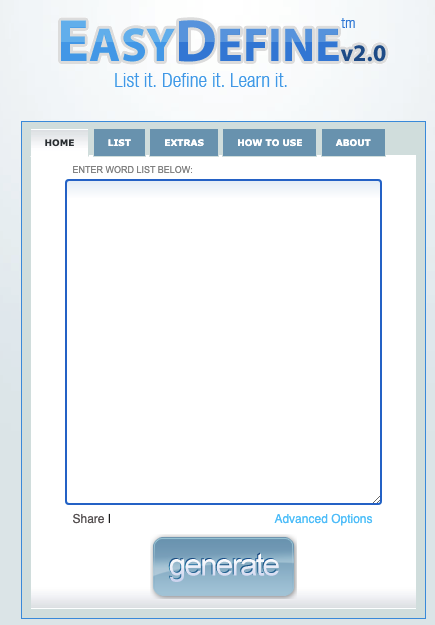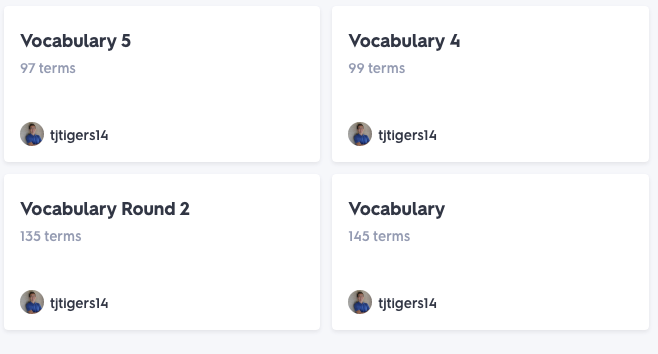I’ve always had this idea of keeping track of every word that I come across but don’t know the definition of. But it’s kind of a challenge, ya know? You have to stop what you’re reading, mark down the word, and then jump back into the reading. Then you have to actually study the list!
Well, I recently decided that I was going to do this for real — I have made it a full-scale personal initiative to keep track of every word that I don’t know and then study them using flashcards. And, well…
This Journey of Improving My Vocabulary Has Been Awesome
I’ve been doing this process for about 6 months and I’ve started to notice some tangible benefits.
Not only have I learned the definitions of over 600 words that I didn’t know before, it also seems to have stimulated the part of my brain that processes and recalls vocabulary (I think this is called Wernicke’s area but I’m definitely not a neurologist).
I notice myself using better words in conversations and in my writing. I can just better articulate what I’m trying to say through effective word choice. And I also more actively work to think of words that better represent my thoughts than the words I typically use.
Another cool side-effect of this practice is that I will be reading and come across any of those 600 words and realize that I already know the definition and don’t have to resort to guessing the meaning. I’ve come across indelible and cacophony and myopic multiple times already!
Plus, I’ve learned the definitions of some really cool words! Some of my favorites are:
Frisson — A sudden shiver of excitement or almost pleasurable fear (some call it a skin orgasm)
Recalcitrant — An uncooperative attitude, especially toward authority
Epiphyte — A living thing (usually plant) that grows on another living thing but is not parasitic.
Beneficence—the quality of being kind or helpful or generous; doing good (I actually got this one from Moira in an episode Schitt’s Creek)
Apophenia—the tendency to mistakenly perceive connections and meaning between unrelated things
So, to summarize, keeping track of every word I don’t know has allowed me to improve my overall vocabulary, discover awesome words, and train my brain in a new way. Not to mention that it’s actually become pretty fun to put together these lists and study them 100 words at a time.
If you’re interested in trying this for yourself, I’ve put together my process below.
My Vocabulary Improvement Process
I’ve come up with a pretty good process to make this exercise easily fit into your life without being too much of a hassle. I think that’s the main thing here — simplifying the process so it’s easily sustainable.
So, without further ado, here is my process. If you’re hoping to improve your vocabulary, I can tell you that this really works!
1. Adjust Your Reading Style
The first thing you have to do is to slightly adjust the way you read things. You’re going to have to keep an eye out for words that you don’t know. I’m not just talking about completely foreign words though, I’m also talking about words that you can’t definitively define or want to know more about.
You’ll have to get used to the idea of grabbing words out of whatever you’re reading and adding them to your master list. Begin to make a habit out of realizing you don’t know a word and then immediately adding it to your list before reading on.
Creating The Master List
This entire exercise would be for naught if we don’t have a centralized, always-accessible master list of your anti-vocabulary. This list has to be instantly accessible at all times. I’m going to go out on a limb and say that, for most of us, this means using digital tools.
Maybe you’re the type of person who actually does carry around a field book, journal, moleskin, or notepad of some sort at all times. If you are, that’s awesome! For the rest of us, we want to pick whatever note taking app we use in our daily lives. For me, that’s Evernote. Evernote is the way that I capture every thought, idea, notion, reminder, or really anything that needs writing down. Others use the Notes app on the iPhone, Google Sheets, or some other tool. But it has to be something you have access to on both your phone and desktop.
Adding the Vocabulary
The process of adding words to your “don’t know” vocabulary list will differ depending on the medium you are reading on. If you’re reading an analog book (real book) then you will have to put the book down, pull out your phone, and add the word to it. Kind of annoying, but if you just keep your phone out near you, it could take less than 10 seconds.
If you read on Kindle there is a truly incredible way to keep track of every word. You just highlight it! This is cool because you can see the definition of the word and highlight it at the same time. Then, occasionally, you just need to go through your highlights and add all the words you highlighted to your master list in batches (I typically do batches of 100 words). This is also great because you can keep the flow of your reading going without having to pull out your phone or open other apps/windows.
If you’re just doing general reading on the web, you should have easy access to your master list already, so just quickly copy and paste it in there.
The real idea here is simply to get in the habit of adding words to the list no matter what or where you’re reading. At this point I add words to the list without even thinking about it.
Creating Study Tools
If you’re like me, you might be a bit of a digital hoarder. I bookmark things willy-nilly, save every article with a semi-interesting headline onto Pocket or Instapaper, and mark way too many books as “Want to Read” on GoodReads. Of course I don’t get to everything, and often I’ll just simply ignore them because I’ve simply added too many things and don’t want to deal with it. You can’t let this happen with your vocabulary list!
If you simply add words to the list without doing anything with them, you’re just saying, “Oh hey, here’s a list of things I don’t know.” There are far easier ways to do that than adding a bunch of words to a list!
It’s important to be diligent about studying the list and not letting it get too out of hand. And what’s the best way to study and improve vocabulary?
Flashcards!
For me, I hate writing — like, actually writing with a pen or pencil—so I’m not going to go out and buy 3×5 notecards and hand write the words and definitions. If you want to do that and it helps you remember, awesome!
I personally found two tools that make it really easy to streamline the process: EasyDefine.com and Quizlet. Here’s what I do:
- Every 100 words or so, I take the list of words and throw it into Easy Define. It’s a really cool tool that takes a list of words and spits out a spreadsheet with definitions for each. It’s really nice because you don’t have to go and Google every definition.
- Take the CSV file that it gives you and go through it to fix words that have subpar definitions or that the tool wasn’t able to find a definition for. Sometimes different dictionaries just have better definitions for words, so if a definition looks pretty off, I’ll go back and find a better one on Google. (Note — Beware of adding phrases with multiple words. The CSV file that’s outputted will often push each individual word to a new line and this can throw off the whole spreadsheet. Just go and add multiple word phrases afterward)
- Now from here you can either manually take each vocabulary word and definition from the spreadsheet and put them onto Quizlet flashcards or, if you know your way around Excel, you can separate the vocabulary words from the definitions into two separate columns using a delimiter and then simply upload that file to Quizlet to make your deck of flashcards!


Don’t Forget — To Improve Your Vocabulary You Have to Actually Study!
Use the different modes that Quizlet offers (their app is truly awesome) and study your words. Start by guessing the word from the definition, then try the other way around so that you can define a word just by seeing it.
I started off with decks of around 150 words but found that these take a little too long so I switched to 100 words per batch.
I try to study my vocab around 4 times a week (going through 100 words until you get each one right only takes about 20 minutes when you first start and far less when you start to master most of the words). Often my master list isn’t growing fast enough to add a new deck, so I go back and study the old ones to stay refreshed.
Wrapping Up
Alright, that’s all I have for right now! I’ve been really excited about this daily practice and thought it could help those who want to add cool, interesting and useful words to their vocabulary! If you have a different method, be sure to let me know in the comments!
Leave a Reply